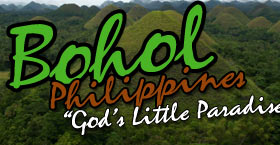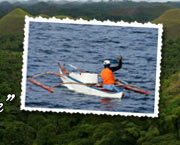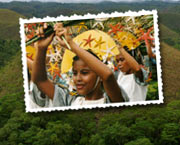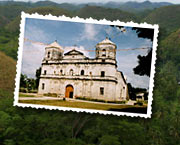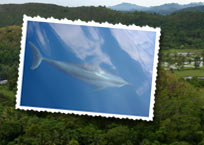Bio-pirates on Panglao seas; scientists leaving next week
Tagbilaran, Friday, 17 September 2004
Non-government organizations (NGOs) in Bohol are alarmed on the news that there are groups of people who are staying on Alona Beach, Panglao Island, are conducting research on marine species. However, NGOs feared it as a kind of “bio-piracy,” a term used for outright extraction of biological materials without regard for national and local regulations and without respect for the rights of source communities. Bio-pirates aim to eventually claim monopoly ownership through patents of the materials collected and their derivatives to the exclusion of the rights of access and control by source states and communities.
‘Boholano bacteria’
It is possible that bio-piracy is taking place in the seawaters off Panglao island. The collectors and their collections of organisms are said to be leaving Bohol next week already.
In one case, bacteria isolated from a soil sample collected in Bohol is now the subject of a patent claim in the United States. In the internet catalog of the American Type Culture Collection which is the official repository of living materials that are under patent claims, entry no. 52340 cites Bristol-Myers Co., a US-based pharmaceutical company, as the depositor/claimant of the said bacteria. The ATCC catalog, from which one can actually order samples of deposited materials for a fee, states that “this material is cited in a U.S. and/or other patent or patent application, and may not be used to infringe on the patent claims.” The fee for a sample of the “Boholano bacteria” is US$190, subject to acceptance of the ATCC’s Materials Transfer Agreement.
The other case involves sea snails in which live specimens were collected from Pamilacan Island in the late 1990s by a US-based Filipino researcher. Residents of the island recalled Dr. Baldomero Olivera, from pictures shown to them, as having paid good sums to fisherfolks who collected live specimens of conus snails. Conus snail, commonly known as gloria maris, is a carnivorous sea animal that stings its victims, including fishes bigger than itself, with a harpoon-like appendage that momentarily stuns the latter. The snail then proceeds to devour the hapless prey. The snail’s sting contains a type of toxin, called conotoxins, which has been the subject of intensive research by Dr. Olivera for its pain-killing potential and as treatment drug for cancer patients.
Presently, there are nearly 50 patents on conotoxins and related compounds registered with the US Patent and Trademark Office. At least seven of these patents cite Dr. Olivera as co-“inventor” with other names. There is now in the market a pain-killing drug for cancer or AIDS patients based on conotoxin compounds. It is said to be 1,000 times more powerful than morphine without the nasty side effects. The market size for this drug, called SNX-111 and marketed by Neurex Inc., easily runs to hundreds of millions of dollars worldwide. No doubt, Dr. Olivera’s collection of conus snails from Pamilacan island was instrumental to his patent claims on conotoxin compounds, and has contributed, directly or indirectly, to the development of the important new drug.
To be sure, there have been other instances in which biological materials taken from the Philippines have been subjected to patent claims. One involves soil bacteria collected in Ilo-ilo province that became the source of the popular anti-biotic called erythromycin or ilosone. The bacteria and the derived drug became the exclusive property of Eli Lilly, a pharmaceutical company. There are also instances about patents taken out on the ampalaya, ilang-ilang, and even on nata de coco.
Microscopic animals
Somewhere in the Pacific Ocean, a ship is combing the high seas for treasures that could yield millions of dollars in profit. No, it is not a pirate ship, although it could very well be nor is it looking for lost gold.
The ship is Sorcerer II, a virtual floating laboratory owned by American multi-millionaire scientist-entrepreneur J. Craig Venter, and the treasures are micro-organisms that live and survive in extreme and harsh conditions of the world’s oceans.
Why all the hassle for such microscopic animals?
The prize is millions of dollars worth of new commercial drugs and products, or even new organisms, which could be derived from these micro-organisms using the latest bio-technology techniques. The controversy is who can claim ownership of the potential new products that will be developed but whose raw materials are organisms collected in seas demarcated by different countries.
It was found out that in an article published by the Canada-based environmental NGO, ETC Group that Venter has been involved in controversy before. In 1991, Venter was a target of worldwide protest when he filed for patents on thousands of genes from the human brain while working for the US government’s National Institutes of Health (NIH). And in 2000, Venter reportedly received $3-million from the US Department of Energy to create a new life form in the laboratory – a single-celled, partially human-made organism.
While Venter’s microbial collection expedition in the high seas may claim to be a legitimate scientific biological prospecting activity, there is a thin line that divides his endeavors with acts of “bio-piracy,” which as the name suggests is “theft of biological resources.”
When collection becomes theft
What is bio-prospecting and bio-piracy, and when does one turn into the other?
Bio-prospecting refers to scientific expeditions to collect biological organisms and genetic materials for the purpose of further research to gain more knowledge about these organisms and study their possible uses for humankind’s benefit. Bio-prospecting to be legitimate must be done in complete transparency as to its objectives and methods and must respect relevant national and local laws as well as the rights of communities and peoples from whose territories the materials are collected from. Bio-prospectors cannot claim ownership over the materials collected and their derivatives unless otherwise provided for in agreements with source States or communities. In certain cases, such agreements include benefit-sharing provisions assuring source States and communities a share of the economic rewards from developing and commercializing products from the collected materials.
Bio-piracy may be disguised as “legitimate” bio-prospecting activities but whose agenda is to eventually facilitate patenting of materials. One indication that bio-prospecting is bio-piracy in disguise is when the collecting group refuses to assure either the government or communities that materials collected and their derivatives will not be subjected to any patent or ownership claims unless under expressed agreements and conditions.
In the case of the Venter expedition, his group has given assurance not to patent raw microbes it collects but the same is not assured on modified microbes or on new life forms engineered from the collected microbes. With today’s powerful bio-technologies, microbial modification and engineering is as easy as ABC, and hence Venter’s patenting agenda is as certain as the sea is salty. Venter and his group will end up with monopoly claims on new microbes modified or engineered from materials they have collected to the exclusion of countries from whose territories these were collected.
The ethical question here is who, in the end, has rightful control over biological materials, including the genes they contain, that are in the public domain, in territories administered by nation-states, but are collected and developed (modified, engineered) by private entities?
Regulating bio-prospecting
The application of patent claims over the soil-based bacteria and the snail-based toxic compounds has effectively deprived the country of “sovereign rights” over the materials that were collected or sourced from within the country’s territory. That right is already in private hands, namely the patent holders, and nobody, including the Philippine government, can make use of the materials without infringing on these patent rights. In contrast, the Convention on Biological Diversity (CBD), adopted in 1993 with the Philippines as signatory, declares that countries have “national patrimony” over all biological and genetic materials within their territories, and hence are subject to national laws and regulations on access and utilization. It was precisely the CBD that prompted the Philippines to adopt bio-prospecting regulations beginning in 1995.
In that year, then Pres. Fidel Ramos signed Executive Order No. 247 that regulated all collections of biological and genetic resources in the country for both academic and commercial purposes. One of the key provisions of the law is that any collector must first get prior informed consent (PIC) from source communities before any collection is allowed. Without the PIC and other requirements of EO 247, collections are deemed illegal and tantamount to bio-piracy.
Recently, the government adopted R.A. 9147 or the Wildlife Act, which contains provisions superseding those of EO 247 with regard to regulating access to the country’s biological and genetic resources. One of the criticisms against the Act is that compared to EO 247, it has watered down the requirements for bio-prospecting and has overly centralized regulatory powers with national agencies to the detriment of the jurisdictional authority of local government units and communities. For example, the Act allows the Bureau of Fisheries and Aquatic Resources (BFAR) to issue collectors with “gratuitous permits” that do not strictly require prior informed consent from source communities or local government units.
The Wildlife Act may in fact encourage more bio-prospecting in the country, and while this may have its good side if it contributes to greater knowledge and better management of our biological resources, it may however be detrimental to our environment if it leads to patenting of collected materials and their derivatives. When this happens, the country loses control over who has the right and how to utilize our biological resources, which is the foundation of any sustainable development. There is indeed a need to be vigilant in protecting our biological resources from bio-piracy but under present circumstances the burden falls on local communities and governments, which have the greatest stake when it comes to access, control and utilization of resources within their territories.
Bio-safeguarding Bohol
Bohol is blessed with abundant biological resources and their conservation is imperative to the functioning of our ecosystems and the survival of local communities. Yet we have not been spared from bio-piracy. Venter’s expedition seems to be the stuff of science fiction mystery thrillers, but bio-piracy is a real thing and Bohol is not immune to this phenomenon.
In the last few months, there has been a survey and collection of marine organisms within the so-called Bohol Marine Triangle, comprising of the seawaters around the towns of Dauis, Panglao, and Baclayon. The activity is being organized by a foreign organization in cooperation with a Philippine academic institution. The expressed objective is to assess and map out the biodiversity of the BMT, especially that of mollusks, which is said to be highly diverse in these waters as part of the greater Indo-pacific marine region. However, samples of collected materials will be brought out of the country for further classification and studies.
The collection expedition was able to get a gratuitous permit from the BFAR on the basis of its application as a purely scientific and academic research endeavor. Unfortunately, the project got off to a bad start last year when the organizers failed to properly coordinate with local governments, communities and NGOs operating in the area. The controversy inevitably raised questions about the motives of the group. Many of the issues seem to have been ironed out though, with the intercession of the provincial government, and the collection project is now about to wrap up its activities. To be sure there are some very interesting information coming out that confirms the richness of the biodiversity in the BMT area. Such information is indeed helpful for local governments and communities to manage and utilize these resources better.
However, there remains lingering concerns on where the materials and information collected might eventually end up, especially that the project involves foreign groups and persons. Among concerns raised by local NGOs was for the collectors to ensure that duplicates of all collected materials be provided and kept within the country for public access, that all information generated will be shared and made available to the public, that materials will not be transferred to any third parties, and that no patents will be applied on all collected materials or their derivatives. These assurances would have been contained in a memorandum of agreement entered into between the project organizers and the provincial government of Bohol. For one reason or other, the two parties have not signed the MOA while the project is about to end and the collections will be brought out of the country.
It is clearly the right of local people, i.e., communities, governments or NGOs, to express concerns and demand assurances when activities involve resources on which their future and that of their children depends. In this case, the project organizers would do well to assuage these concerns, and for the provincial government to protect the public interest. Adopting the MOA with the proposed conditionalities would be the first step while ensuring compliance by all parties concerned remains the greater task ahead.
In the end, this might be the right time for Bohol to adopt a bio-safeguard framework that will legislate and regulate access and utilization of local biological and genetic resources and to protect them from any patent monopolization. The framework shall be within the powers and obligations of the local government to protect the environment and in the context of sustainable use and conservation of these resources for present and future generations of Boholanos and Filipinos in general. With the growing threat and actual incidents of bio-piracy coming to our shores, it is now a challenge for stakeholders to help realize this bio-safeguard framework. (Note: This article appeared on Bohol Sunday Post July 11 and 18 issues and was approved by many NGOs in the province of Bohol.)
Leo Udtohan
What readers think...
| Moises Batingal wrote: |
| Sunday, 7 August 2005 07:24:35 PHT |
| Stop bio-piracy by all means. Its thievery in disguise. No excuses, be it done by the government or the private entities. |
| Leo Udtohan wrote: |
| Saturday, 26 February 2005 22:20:42 PHT |
| Please visit this website www.panglao-hotspot.org/Templates/new.html |
| Salaanduero, Kristine wrote: |
| Thursday, 17 February 2005 22:13:26 PHT |
| It's not bad to do such reaserch but I should advise, "let them have a good reason with respect for the beautiful natural resources of Bohol." let them have an ultimate permission from the highest people of the Philippines and of course, from the Bohol government. thanks leo. |
| Marina wrote: |
| Thursday, 20 January 2005 13:46:03 PHT |
| You have an interesting article about bio-piracy happening in Bohol. I suggest you coordinate with our office; Philippine Center on Transnational Crime, website: www.pctc.org.ph. Bio-piracy is considered as a transnational crime.
Good to see a pro-active crime fighting office! The problem of course is providing proof that such things happen. Research that starts out as pure science, such as collecting samples of species to establish biodiversity, can have follow-up research on these samples with more direct application, such as for example the poison produced by certain shells, that might proof to be a medicin against certain nerve diseases. The link between purely scientific and later applied science may be difficult to follow, as different researchers may be involved, who may never have entered the Philippines. Although patents are not always a good thing, and their granting should be based on public interest alone. In case of pharmaceuticals, there is a probably a good case for patents, as they enable the costly research required to discover the medicines in the first place. My advice would be to meticiously verify all agreements are signed, and require utmost openness from visiting researchers. It may also be advisable to add a standard waiver of patent rights derived from materials sourced in the Philippines on all visa applications, to be co-signed by employers if they are active in the pharmaceutical field, and require additional MOU's if there are different intents.--Jeroen. |
| Paul wrote: |
| Monday, 17 January 2005 08:55:14 PHT |
| I am a person who has been following some of this research for pain medicine. I live with Reflex Sympathetic Dystrophy (some of the worst pain than can be had). We in the the rsd community had great hopes for the drug made from the study of the snails. But so far the side effects are not so good from my understanding. I came here looking for info for my next trip to the Philippines. And to my surprise I find that the people doing this research are Pirates. We are not told anything about this in America. I think from my perspective this is totaly wrong. There should be a legal way to do this if it can be done without harming the enviroment, and with compensation to the community. I know that there are people with very bad pain that would not agree with me they would say what ever to get the pain in control and I myself have said this at times what will it take to get this pain under control. With Very Bad Pain some people take their own lives (I have even planned my own death to escape from this nightmare and I know another man who has thought the same. I regret the trespass and piracy of these people. As a person who lives his life In Christ I know, and have the strength not to take my life. So maybe this is a view from a person who could benefit from this, but I will not promote it. As Christians we have a duty to protect Planet Earth. |
Read all 8 comments by readers.
Also give your comments on this article
We reserve the right to remove or edit comments posted on this website. Please read our conditions of use for details. You can use <i>italics</i>, <b>bold</b>, <p> new paragraph, <a href="url">link</a>. Other markup will be removed. Use of the forums for advertising is prohibited. Enterprises located in Bohol can request to be added to the business directory.
